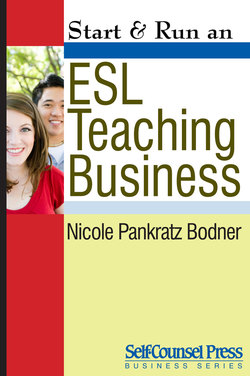Читать книгу Start & Run an ESL Teaching Business - T. Nicole Pankratz - Bodner - Страница 26
На сайте Литреса книга снята с продажи.
Оглавление3
Understanding Your Role in the ESL-Tutoring Market
Hiring a tutor is a way for new immigrants and international students in public and private school systems to get ahead. With its personalized lessons and one-on-one attention, tutoring works for people from all walks of life, from the newly landed young person struggling to keep up with his or her middle-school classmates to the adult student needing a crash course in TOEFL in order to enter a North American post-secondary institution. Immigrant parents of young children hire language tutors and homework helpers, as do international graduate students and businesspeople with money available for language lessons or assistance with the writing or editing of documents and essays.
In Asia and many other parts of the world, hiring a tutor for help in English (and math and science) is common practice. When students come to North America to study English at a private ESL school or college, some hire conversation tutors to enhance their classroom performance. Students who have only a limited amount of time overseas might need one-on-one expert help in specific areas such as business English, TOEFL, or TOEIC. Some students even choose to attend classes part time, devoting the remainder of their time to private lessons and self-study.
Affluent parents of university-bound immigrant youth often send their children to after-school institutions that offer personalized academic help. Some seek out tutorial services that have tutors who conduct lessons in students’ homes.
A recent trend in the industry is to provide ESL services to international students with special needs, such as physical impairments or even social and emotional issues that make participation in a typical ESL classroom difficult or overwhelming.
Exploring Your Market
In order to determine what kind of tutorial service you are going to operate, you need to explore your market options. First, find out what kind of ESL students live and study in your area. Are they international students preparing for university or college in North America? Are they visitors looking for a few months of overseas fun and conversation with native English speakers? Are they new immigrants who have children struggling in the English-based school system?
You also need to find out how many students in your area come from countries that understand and value personalized language instruction. How many students hired tutors in their home country? More important, how many would be willing to pay for such services overseas?
Another consideration is the expectations of the students. What kind of tutorial arrangement are the students accustomed to? Do they prefer a formal arrangement that is signed and sealed in contract form or an informal agreement, with flexibility in terms of times, location, and even payment schedule? What kind of tutorial facility are they expecting — an official tutorial-business site? A public place, such as a library or a café? The tutor’s home? The student’s home?
Understanding students’ expectations regarding money is also important. How much do students expect to pay for tutorial services? And what do they expect to be covered by that fee — textbooks? Photocopied materials? A ride to and from the tutorial site? Coffee and/or snacks?
The more you can find out about what students expect, the better you can plan how you will meet their needs.
Finding a Niche Market
Now that you have a clear picture of your market, it is time to make decisions regarding your operation. Are you planning to have an official location, equipped with tutorial rooms and set hours of operation? Or are you going to go the more portable route, with a website and telephone number as contact information, and a variety of location choices available to students, such as their home, your home, and the library?
Part of your decision should be based on where you see a gap in the market. If your area already has an established tutorial service that serves the after-school immigrant market, you might want to offer parents an alternative setup with flexible hours and more personalized service. Or you might simply pursue the international student market.
On a similar note, if your area does not have a formal tutorial service, but instead features a loose network of people willing to tutor, you might want to establish a formal business that unites them under one umbrella.
Finding your niche requires legwork. The first step is finding out what is missing in your area. You then need to talk to prospective students about the options they would like to have. For example, there may be a need for evening or weekend tutoring. Or, perhaps international students would make good use of a drop-in center.
Keeping an eye out for new and emerging markets — such as international students with disabilities or immigrants running businesses who have shaky English skills — will also help you stay competitive.
